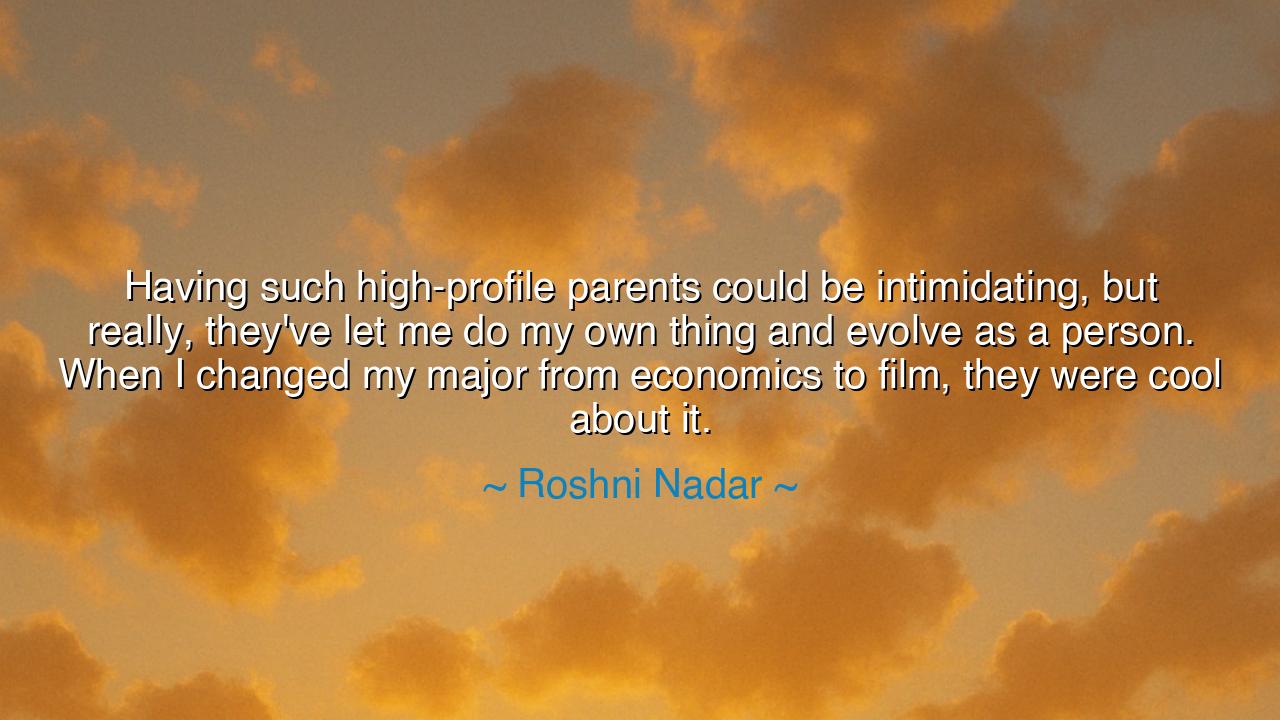
Having such high-profile parents could be intimidating, but
Having such high-profile parents could be intimidating, but really, they've let me do my own thing and evolve as a person. When I changed my major from economics to film, they were cool about it.






"Having such high-profile parents could be intimidating, but really, they've let me do my own thing and evolve as a person. When I changed my major from economics to film, they were cool about it." These words from Roshni Nadar carry a profound message about freedom, growth, and the ability to choose one’s own path, even in the face of great expectations. Nadar’s reflection on the relationship with her parents reveals a deep wisdom—the kind that values individuality and the process of personal evolution over the pressures of living up to external ideals. Her parents, who could have easily imposed their own expectations upon her, chose to support her in becoming the person she was destined to be, rather than who others thought she should be.
In the ancient world, the concept of freedom and personal growth was closely tied to self-actualization. The Greeks, particularly through the teachings of Socrates and Aristotle, believed that true happiness and fulfillment could only be achieved through the pursuit of one's own path and the development of one's unique virtues. Socrates often spoke of the importance of self-knowledge and living in accordance with one's authentic self. Aristotle, in his works on ethics, argued that every individual has a specific purpose or function in life, and that true happiness comes from fulfilling that purpose through personal effort and choice. Nadar’s decision to change her major from economics to film reflects this ancient ideal—the understanding that we must choose our own course, even when faced with the influences of others.
Consider the story of Alexander the Great, whose father, King Philip II, had grand plans for him to inherit the throne and expand the kingdom of Macedonia. However, young Alexander’s ambition and vision were far greater. His desires led him beyond the kingdom’s borders—to conquer the known world. Philip could have imposed his will on his son, but instead, he supported Alexander’s path, knowing that true greatness would come from allowing his son to pursue his own vision. Alexander’s freedom to choose his own destiny was central to his legendary success. In the same way, Roshni Nadar’s parents recognized that their support in letting her follow her own passions would allow her to evolve into someone who could achieve greatness on her own terms.
The wisdom of letting one evolve into their own identity was also embraced by the ancient Romans, particularly in their philosophy of virtus—the cultivation of personal excellence and moral integrity. The Roman statesman Cicero often spoke of the importance of developing one's character, emphasizing that true nobility is not found in titles or external recognition, but in the way one chooses to live their life. By allowing Roshni to shift from economics to film, her parents are nurturing her ability to choose her own path, to develop her own vision, and to follow her own sense of virtue. This is the ancient principle of self-governance—the belief that the individual must be empowered to make decisions that reflect their inner calling.
The lesson here is one of trust and empowerment. Nadar’s parents understood that while they might have had certain hopes for their daughter, true growth would come from allowing her the freedom to make her own choices. The gift of freedom to explore, to try, to fail, and to succeed on her own terms is one of the greatest gifts a parent—or any mentor—can give. This act of empowerment is not just about choosing a career or a path in life; it is about developing the strength and wisdom to make choices that align with one’s deepest self. It is the ultimate act of love and support—believing in someone's ability to navigate their own course and trusting that they will become the person they are meant to be.
In practical terms, we can all learn from Nadar’s experience. In our own lives, whether as parents, mentors, or friends, we must recognize that growth often requires freedom—freedom to explore, to make mistakes, and to embrace the process of evolution. While it is natural to want to guide others, true growth occurs when we trust people to discover their own paths, to follow their own passions, and to make decisions based on what aligns with their authentic selves. We must allow the space for others to grow into the best versions of themselves, without imposing our own limitations or expectations upon them.
The practical action we can take is to create environments that support autonomy and self-expression, whether in our families, workplaces, or communities. We must encourage others to follow their dreams, even when they seem unconventional or different from our own. Just as Nadar’s parents allowed her to pursue her passions without judgment, we too can build a world that fosters individual choice, personal growth, and self-discovery. The future will be shaped by those who are allowed the freedom to become who they are meant to be, not by those who follow predetermined paths set by others. Just as Alexander became the conqueror of his world, and Socrates became the philosopher of his time, so too can we become the architects of our own destinies when we trust in the power of personal choice and self-evolution.






AAdministratorAdministrator
Welcome, honored guests. Please leave a comment, we will respond soon